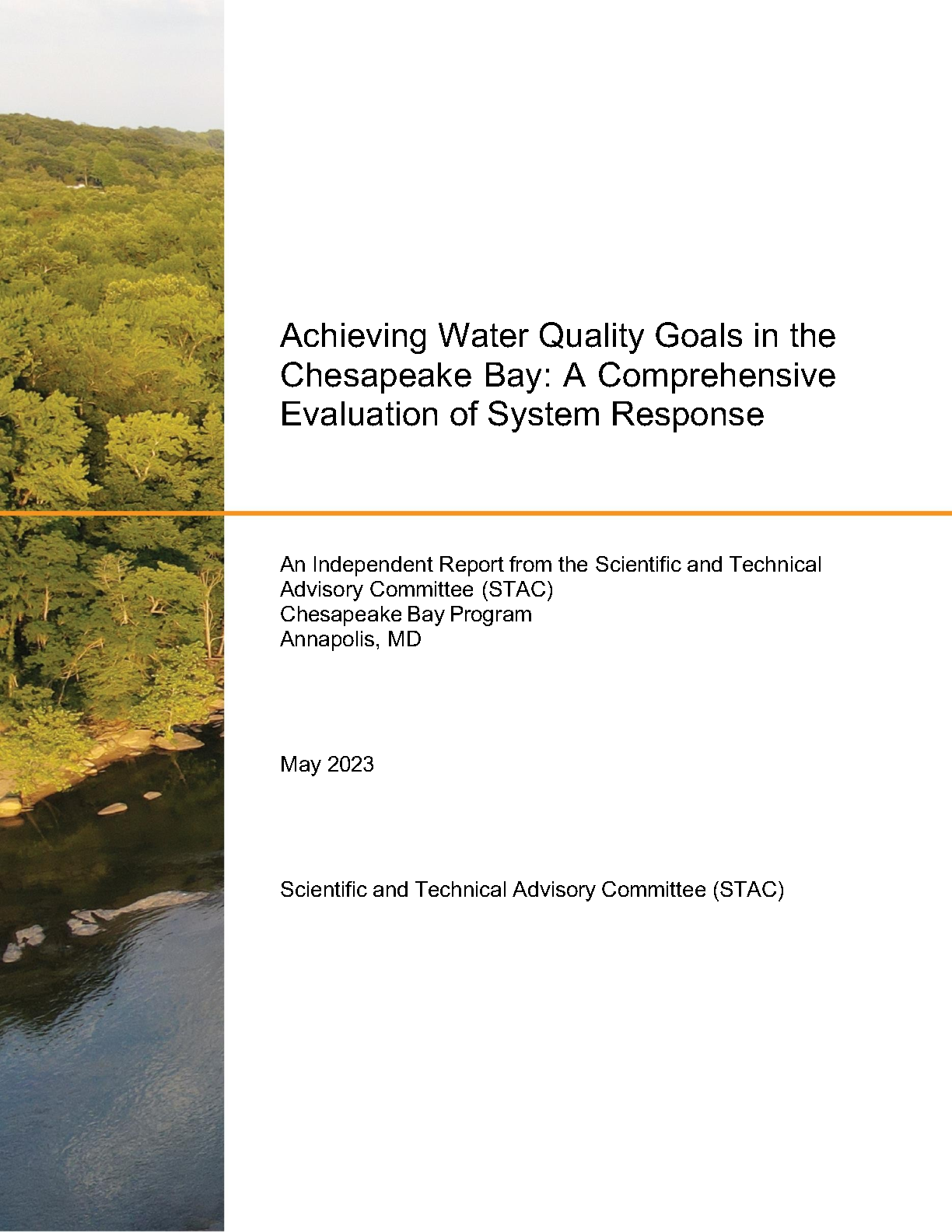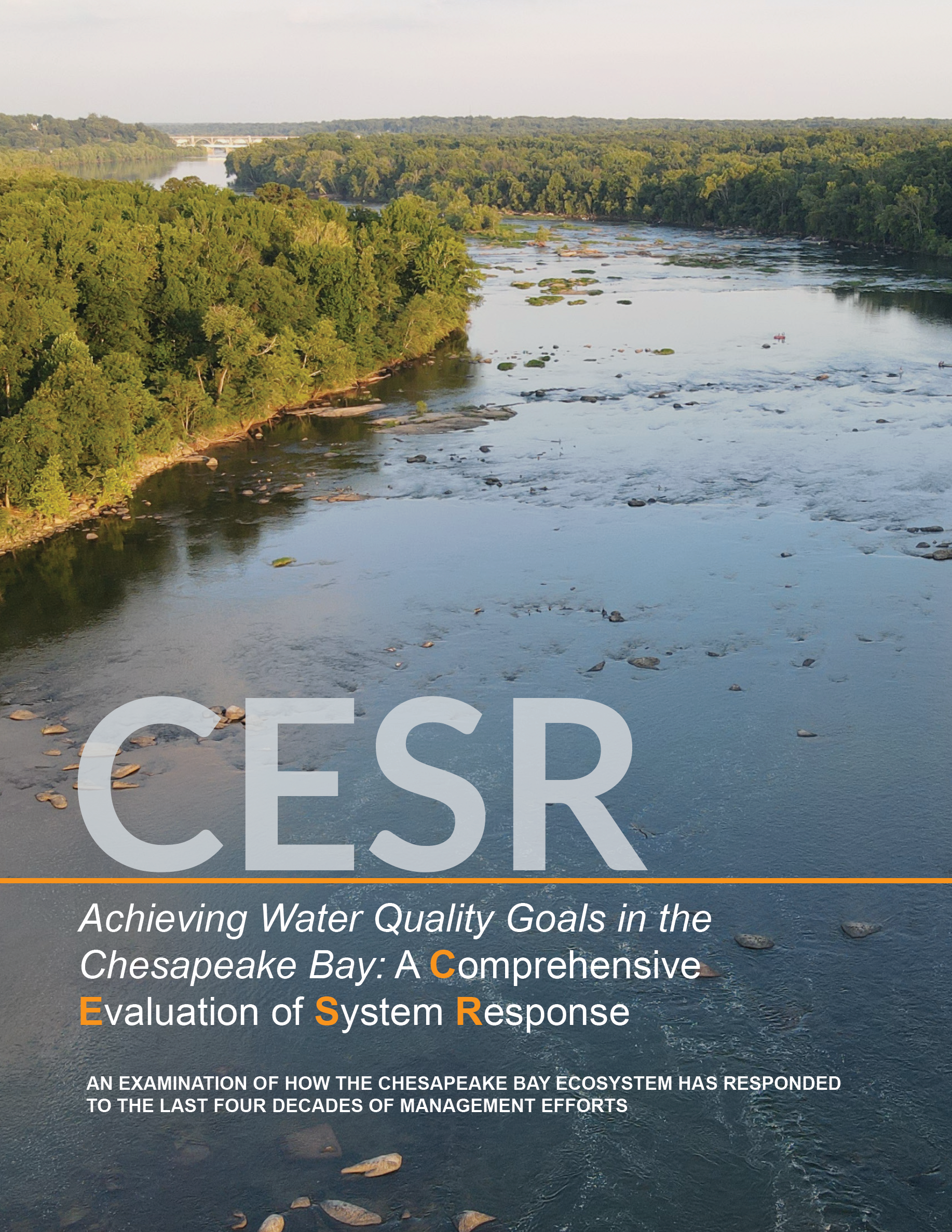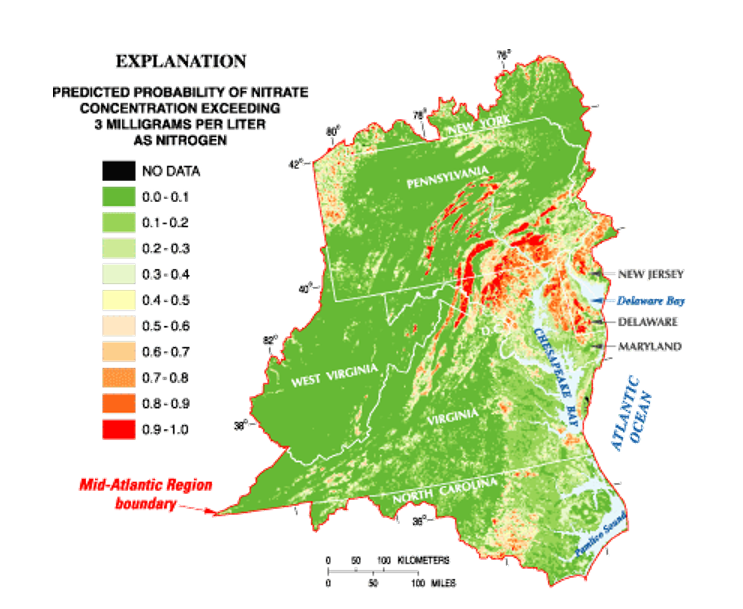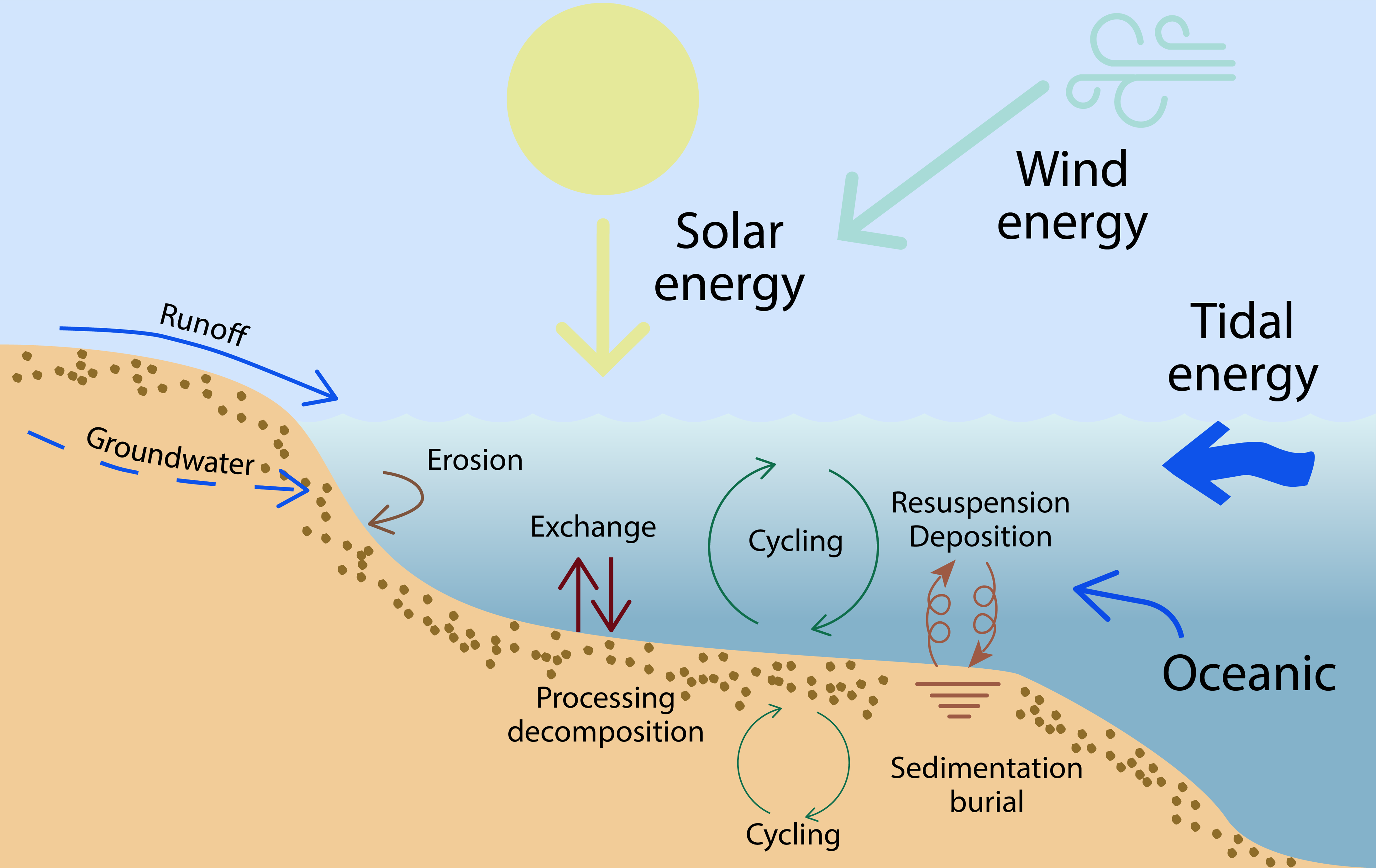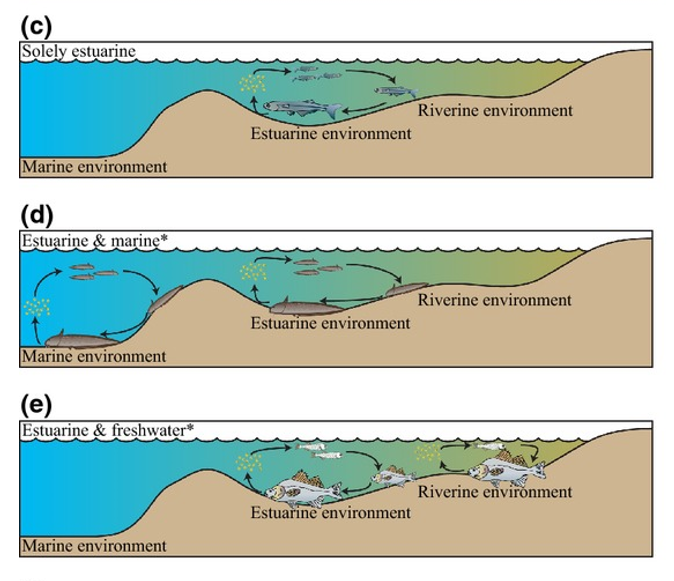A Comprehensive Evaluation of System Response
The newly-released Report in Brief for the Comprehensive Evaluation of System Response (CESR) report is available now!
The 12-page summary features major findings, paths forward, and new graphics. The CESR Outreach Committee developed a 12-page summary document of the major findings and paths forward accompanied by engaging graphics and photography. The CESR Report in Brief is now available to guide you through understanding STAC’s evaluation of the Chesapeake Bay restoration effort. Download your copy here.
Achieving Water Quality Goals in the Chesapeake Bay
The May 2023 report, A Comprehensive Evaluation of System Response (CESR), summarizes the Scientific and Technical Advisory Committee (STAC) evaluation of why progress toward meeting the TMDL and water quality standards has been slower than expected and offers options for how progress can be accelerated. CESR is a summation of a three year investigation into the 40 year effort to reduce nutrient loads to Chesapeake Bay.
In this video, some of the contributors to CESR provide an overview of the document, its implications for management of the Chesapeake Bay and its watershed, and how this effort could have only been achieved by a group like STAC. You can access the video online here.
Details
The effort began as a STAC independent initiative in March 2019, after Kurt Stephenson, Zach Easton, and Brian Benham proposed the idea of a report that would identify gaps and uncertainties in system response—physical, chemical, biological, and socioeconomic—that impact efforts designed to attain water quality standards in Chesapeake Bay. As STAC Chair at the time, Benham facilitated the development of a collaborative process that would engage the entire committee. This process consisted of two major components:
1 – Workgroups were formed around the subsystems of the chain linking management action to water quality and living resource response: nutrient and sediment reductions (watershed), water quality response to nutrient and sediment reductions (estuary) and living resource response to water quality (living resources). Reports were generated by each workgroup.
2 – A steering committee developed a series of framing questions to guide the preparation of this report that would meet the objective of identifying gaps and uncertainties in achieving the Bay TMDL and water quality standards. Coeditors Stephenson and Wardrop, supported to great extent by a subgroup of the Steering Committee (Leonard Shabman, Zach Easton, Jeremy Testa, William Dennison, Kenny Rose, and Mark Monaco) were tasked with assembling ideas and contributions to write a single draft text, drawing material from the aforementioned workgroup reports, STAC and Chesapeake Bay Program reports, the scientific literature, and a limited amount of additional analyses performed in collaboration with Bay Program scientists. The resulting report was then submitted for several reviews by both steering committee members and the membership at-large to produce a consensus report.
These individuals make up the team that wrote the CESR report.
Bill Dennison – University of Maryland Center for Environmental Science
Zachary Easton – Virginia Tech
Mark Monaco – National Oceanic and Atmospheric Administration (NOAA) National Centers for Coastal Ocean Science
Kenneth Rose – University of Maryland Center for Environmental Science
Leonard Shabman – Resources for the Future
Kurt Stephenson – Virginia Tech
Jeremy Testa – University of Maryland Center for Environmental Science
Denice Wardrop – Chesapeake Research Consortium/Pennsylvania State University
The following presentations have been given over the past year by members of the CESR Outreach and Communications team to groups within the Chesapeake Bay Program partnership. The purpose of this ongoing engagement is to advance dissemination and understanding of the CESR findings and motivate implementation of the options identified in the report.
September 2025
November 2024
September 2024
May 2024
July 2023
June 2023
- Water Quality Goal Implementation Team Webinar
- Choose Clean Water Coalition
- Local Government Advisory Committee
- Maryland Governor’s Bay Cabinet
May 2023
- STAR Living Resources Presentation
- Chesapeake Bay Foundation Briefing
- Strategy Review System Biennial Meeting
- UMBC Webinar
April 2023
March 2023
January 2023
November 2022
- Chesapeake Bay Commission
- Management Board
- Goal Implementation Chairs and Leadership
October 2022
June 2022
- Chesapeake Community Research Symposium Plenary
- Chesapeake Community Research Symposium 2022: Living Resources
- Chesapeake Community Research Symposium 2022: Estuary
2020
Since its release, the CESR report has been featured in several news articles and reports. We will continue to update the list below.
- American Farm: Play nice while sandboxing (Editorial)
- Bay Journal: Accepting leadership gavel, Maryland governor vows new approach toward Bay
- Department of Legislative Services, December 2023: Issue Papers 2024 Legislative Session (pg. 164)
- The Baltimore Sun: ‘I want our state to be a model’: Maryland Gov. Wes Moore to chair Chesapeake Bay Program
- Chesapeake Bay Foundation: Chesapeake Executive Council Elects MD Gov. Moore to Chair at Pivotal Time
- The Baltimore Banner: Gov. Wes Moore outlines new approach to Chesapeake Bay cleanup
- Chesapeake Bay Foundation: What Should the Future of Chesapeake Bay Watershed Restoration Look Like?
- The Virginian Pilot (Norfolk, Va.): Current efforts are not enough in Chesapeake Bay cleanup, report says. New thinking is required.
- The Williamsburg-Yorktown (Va.) Daily: Report: Current efforts to reduce Chesapeake pollution will not meet water quality goals
- Bay Journal: Saving the Bay means creating a future with and for people
- Bay Journal: In major new report, scientists outline path to a better Chesapeake Bay—but it’s a slow one
- The Richmond (Va.) Times-Dispatch: Bay cleanup lags; science group calls for new approaches
- WHRO-NPR (Hampton Roads, Va.): Chesapeake Bay cleanup is taking much longer than expected—and needs to switch gears, new research says
- Virginia Mercury: Report details why progress to clean up the Chesapeake Bay has been slow
- Cape Charles (Va.) Mirror: Report: Chesapeake Bay still be nasty
- Stormwater Solutions: Chesapeake Bay Foundation releases report on slow restoration
- WJLA-ABC (Washington, DC): New report shows decades of Chesapeake Bay restoration work is not yielding results
- E&E News: Chesapeake Bay needs faster, stronger cleanup, experts find
- Chesapeake Bay Magazine: New report shows why Bay cleanup practices aren’t working
- Lancaster (Pa.) Farming: Report: Chesapeake Bay isn’t improving as expected
- WTOP News (Washington, DC): Report: Better Chesapeake Bay water quality ‘remains in the distant future’
- Inside EPA: Chesapeake Bay Program urges overhaul of TMDL
- WBOC-CBS (Salisbury, Md.): Chesapeake Bay Program releases new report on water quality
- Chesapeake Bay Foundation: CBF issues statement on new Bay restoration report
The Report
Resource Documents
Policy Prospectuses
Additional Resources
In the list below, you can find STAC publications that support or are related to the CESR document.

